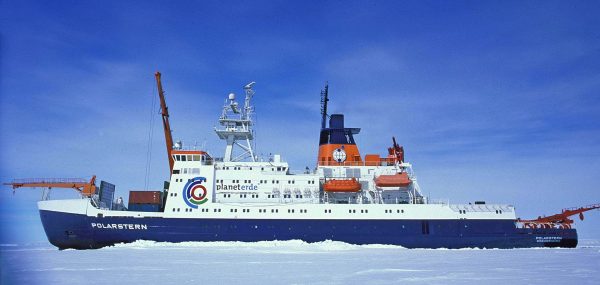RV Polarstern Research Ship Drifting In The Arctic All on Board Doing OK
A research ship, RV Polarstern, is on a year long Arctic expedition that has purposely trapped themselves in the polar ice in order to study the atmosphere, the ocean, sea ice, and the ecosystem.
It is the flagship of the Alfred Wegener Institute for Polar and Marine Research of Bremerhaven, Germany and International Polar Research.
The expedition will involve people from 20 different countries at various times. Unfortunately, some studies were postponed as one researcher on a team tested positive for Covid-19.

Sciencemag.org reports that the leader of the expedition, Marcus Rex, says the crew member never actually boarded the ship; everyone is tested twice before arrival. As a result, the twenty team members planning to go on this air mission are now under quarantine in their homes.
The team, which does scientific flights with research aircraft to measure gas concentrations in the Arctic atmosphere, will complete their work after quarantine.
Several members of the expedition are due to join the ship when it reaches the North Pole, but they have been tested already and will be tested again before they board the ship.
Rex believes that the double testing procedure has proven to work well. He notes that Coronavirus outbreaks have happened on some cruise ships leading to the extra precaution of two tests.
The RV Polarstern is one of the most important polar research ships in the world. It was commissioned in 1982 and was completely overhauled between 1999 and 2001.
According to MOSAiC, the ship operates three hundred and seventeen days a year and covers about fifty thousand nautical miles during that time. It carries a crew of forty-four and has a capacity of one hundred and twenty-four people.
It is about three hundred and eighty-six feet long and is capable of seventeen miles per hour. The ship is not only a research vessel but is also an ice breaker that can ram almost ten foot thick ice jams.
The RV Polarstern is part of the Multidisciplinary drifting Observatory for the Study of Arctic Climate, also known as MOSAiC; their goal is to spend an entire year in the central Arctic exploring the climate system in order to provide a more improved scientific basis for decisions on climate change and adaptation.
The current models of ice reduction are based on a gradual decline, but recent observations show the tests must be bumped up exponentially before we can get a true model.
MOSAiC is studying the evolution of sea ice and its relationship with different water temperatures such as the way the atmosphere reacts from the surface of the ice to just over twenty miles to the stratosphere.
#Coronavirus crisis has affected an ice-locked Arctic research expedition. A team member tested positive for SARSCoV2. The rotating crew of some 300 polar scientists on are conducting experiments aboard Polarstern https://t.co/krJpAFQIuE pic.twitter.com/BUDaqDCL3r
— delthia ricks 🔬 (@DelthiaRicks) March 12, 2020
Precipitation, clouds, and aerosols are being studied to learn more about how they interact with each other in the atmosphere.
Although Arctic winters bring brutal conditions, there are many organisms that have adapted well to the harsh climate. MOSAiC is studying how these creatures survive when their homes are covered with thick ice allowing in no light for photosynthesis.
As the permafrost melts, pockets of methane rise up into the atmosphere adding to the problems of excess gases in the atmosphere which is also being studied by MOSAiC.
A regional grid of observational locations has been set up on the sea ice in an area around the ship, floating with the natural ice drift across the polar cap toward the Atlantic.
In addition to the RV Polarstern, the expedition is using German research aircrafts Polar 5 and Polar 6 in support of the larger ship.
Alfred-Wegener-Institute reports that Dr. Ursula Schauer, chief scientist of the expedition on the RV Polarstern, remarked, “From a scientific point of view the North Pole is not more interesting than other places in the Arctic.
Five Islands Appear In Arctic: Melting Ice Reveals Lands Not Seen Before
The expected changes are rather minor here. However, the northern part of the Canadian sector of the Arctic still numbers among the least researched regions on the globe because of the dense pack ice.” And MOSAiC plans to continue adding to scientific knowledge despite the pandemic.





